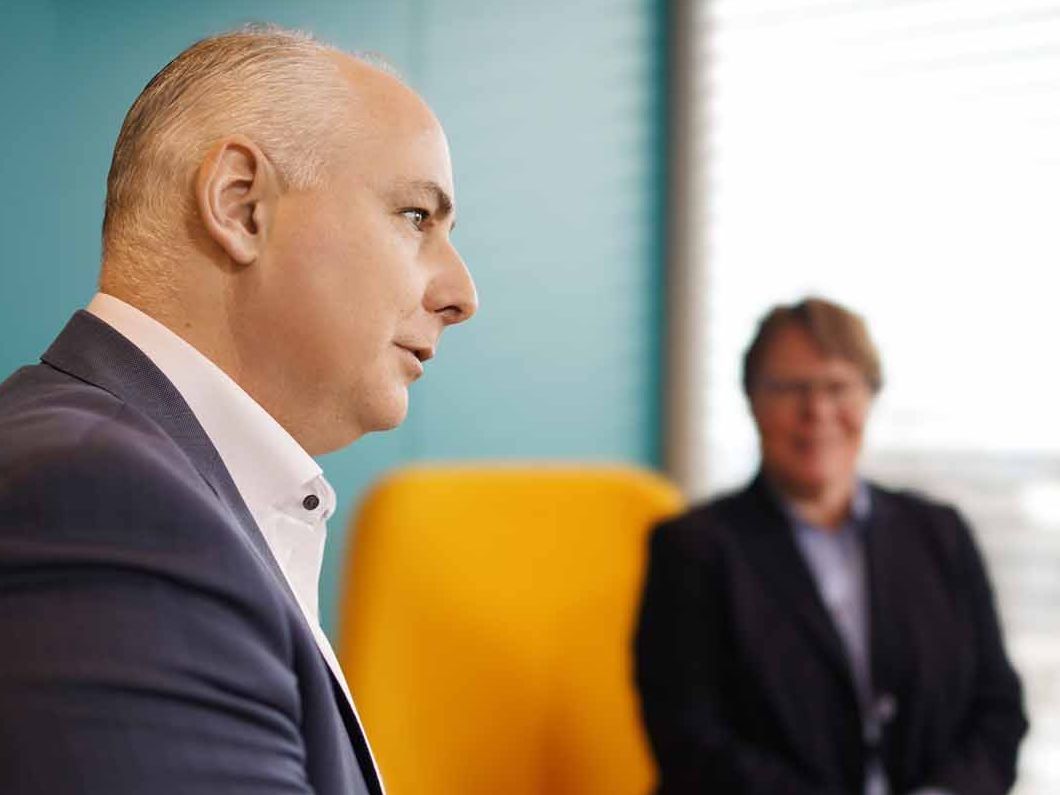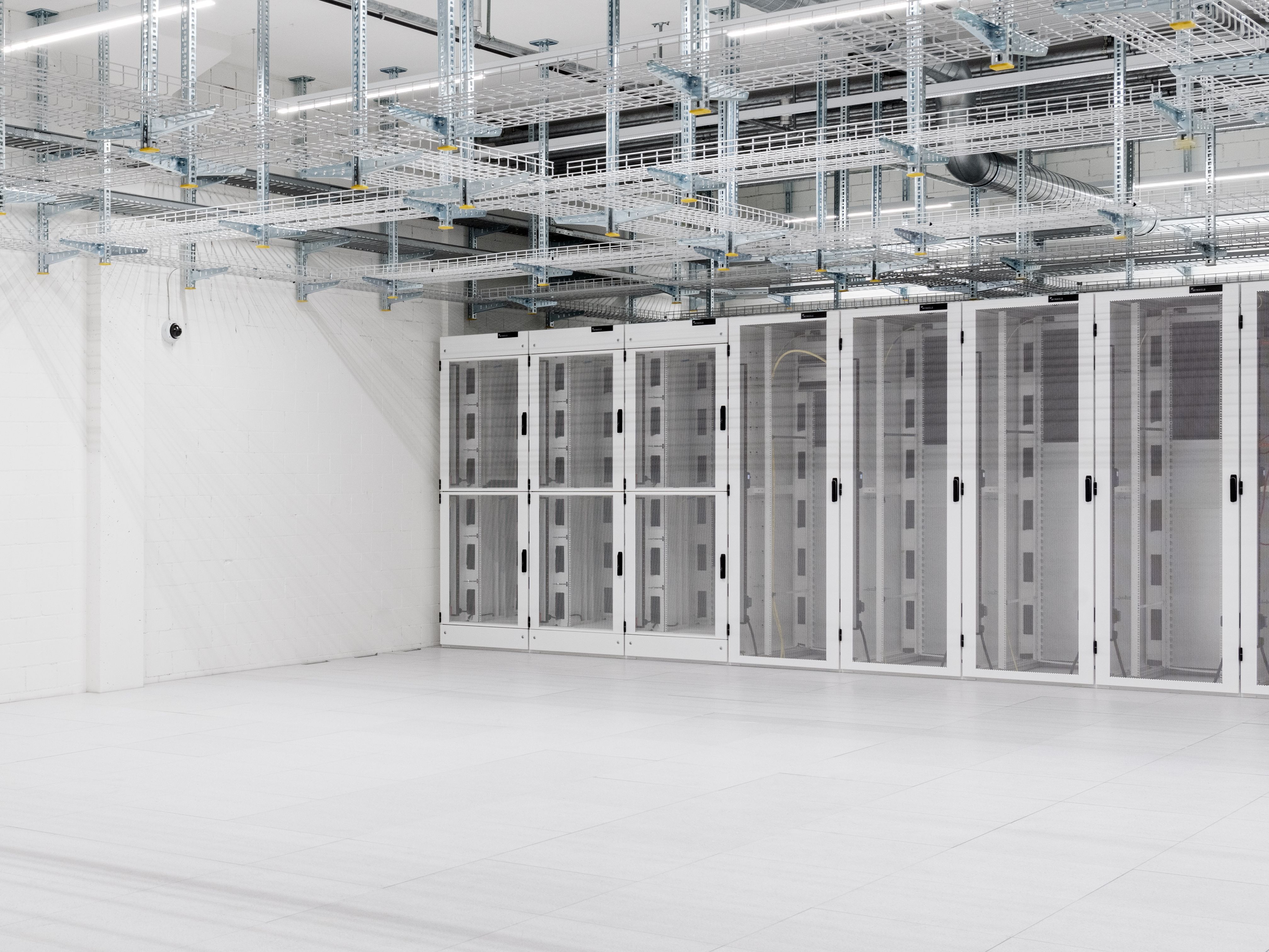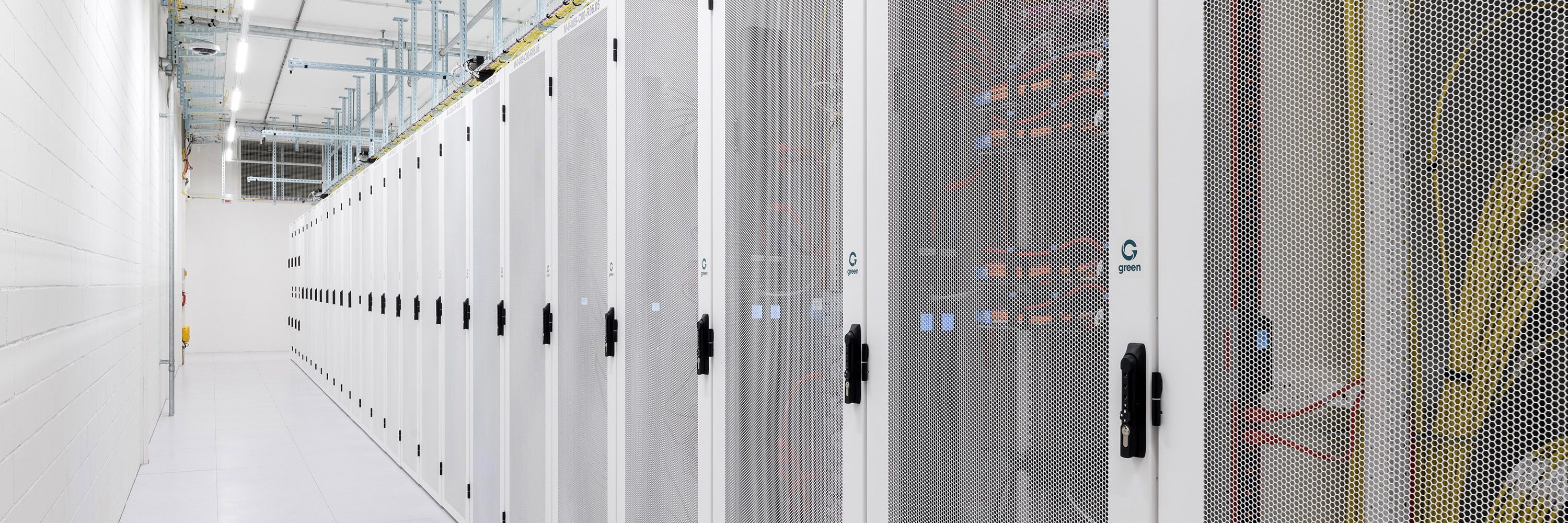![[Translate to Englisch:] [Translate to Englisch:]](/fileadmin/_processed_/5/f/csm_AdobeStock_628395867_17f7e90faf.jpeg)
High Performance Computing - Digital freedom is the cornerstone of corporate resilience
Today, technology underpins entrepreneurial freedom of choice. Shaping technology yourself – rather than being dependent on it – not only safeguards your systems, but also your entrepreneurial scope for change, growth and resilience.
Many companies are faced with the challenge of aligning legacy infrastructures with new requirements, such as technological links to specific providers, extraterritorial laws such as the US CLOUD Act, limited scalability and increasing regulatory complexity. In-house data centers, which can’t be modernized without significant investments and long lead times, can also limit business agility.

«Technological decisions have a direct impact on how capable and future-proof a company will remain over time. In the past, the focus was on functionality or efficiency, while today we think more about control and independence.
In this interview, Marietta Hersche, CMO of Green Datacenter AG, and Roger Süess, CEO, talk about how companies are consciously shaping digital sovereignty, making effective use of new technologies, and securing future scope for maneuver with resilient infrastructure. Because: making smart technological decisions today means regaining control and opening up new strategic scope.
Roger, when we talk about IT strategies today, terms like cloud usage, security, compliance and flexibility often come up. At Green, we focus on digital freedom. Why is this freedom so crucial right now – and what is the specific added value for companies?
Today, digital freedom is a business-critical factor. Technological decisions have a direct impact on how capable and future-proof a company will remain over time. In the past, the focus was on functionality or efficiency, while today we think more about control and independence.
Choice of supplier can have far-reaching consequences due to regulatory requirements, geopolitical tensions and economic dependencies. That’s why we believe in digital freedom of choice. Companies should be able to determine for themselves which workloads belong in the cloud and which workloads are better operated locally.
It is crucial that technologies can be combined flexibly – with no restrictions. If you don’t make IT decisions consciously, you run the risk of becoming entangled in a model that is difficult to change later on.
For me, infrastructure is a strategic foundation rather than a limitation. Our job is to create the conditions for our customers to remain flexible – no matter how their business develops.

Companies should be able to determine for themselves which workloads belong in the cloud and which workloads are better operated locally.
In recent years, many companies have opted for cloud-first strategies as a sign of openness and innovation. Today, with the change in framework conditions, we are seeing greater differentiation. Roger, how do you view this development and what do you think are the most important criteria for future-proof IT architecture?
We are seeing a shift away from across-the-board cloud-first paradigms towards sophisticated, hybrid strategies. There is no longer a single correct solution. Today, companies are taking a more nuanced approach to the question: where does the cloud offer genuine added value? Where is control, security or performance more important?
A good example is the use of artificial intelligence. AI applications require enormous computing power and specialized environments, which are often available in the cloud. At the same time, we also have to think about sensitive data, compliance requirements and sovereignty. This means that companies are increasingly using hybrid models. They are harnessing the innovative power of the cloud without losing control over business-critical processes.
So future-proof IT architecture requires clarity around your own requirements. The aim is to make informed technological decisions with a view to scalability, regulatory security, integration and adaptability. Not every workload belongs in the cloud. But every architecture should be open enough to evolve.
Where does your business stand? |
When we talk about platforms, infrastructure strategies and development perspectives, we almost inevitably arrive at a central issue: digital sovereignty. Hybrid models in particular beg the question: who controls what – and where? Roger, how do you define digital sovereignty in the business context?
For me, digital sovereignty means that companies have full control over their own business-critical resources. And not just formally, but in a very concrete sense, in day-to-day operations. It’s not enough to know where data is located – they key is who has access to it, how it’s processed and on what technological basis.
With cloud-based AI applications or platform services used in productive operations, in particular, there is a real risk that sensitive data will be processed automatically and unintentionally made available to third parties. This can not only undermine data protection pledges made to customers but also lead to serious compliance violations – particularly in regulated industries.
For me, it’s not a question of isolation. The question is more: how do I design my infrastructure in such a way that I retain my ability to act in the future, whether it’s in dealing with regulatory changes, geopolitical tensions or technological developments?
Companies that consciously control their digital dependencies create the flexibility they need – and this is precisely what determines whether they can continue to operate securely and
independently in the future.

How do I design my infrastructure in such a way that I retain my ability to act in the future?
Innovation never sleeps – is your business ready? |
We’ve talked a lot about the requirements companies place on their digital infrastructure nowadays. What distinguishes Green from other providers in this environment, and what is the company’s approach when it comes to giving companies real freedom of choice?
Our aim is to give our customers the freedom they need to focus on their core business without having to deal with complex infrastructure issues.
Our data centers in Switzerland provide the solid foundation for this. They’re highly secure, independent and locally embedded. Not to mention the fact that leading hyperscalers are represented directly at our locations. This gives our customers more scope. They can seamlessly leverage scalable cloud services while managing sensitive or mission-critical workloads in a sovereign, controlled environment.
With a strong partner ecosystem by our side, we create the conditions for hybrid architectures that enable genuine digital freedom.
Roger, we’ve talked about digital freedom, strategic controllability and hybrid architectures. If we go a step further, we quickly arrive at another key issue: sustainability. How does this requirement change the demands on modern IT strategies?
Sustainability has long since gone from nice-to-have issue to key component of modern IT strategies. Today, companies are faced with the challenge of combining technological performance with energy efficiency, CO2 transparency and regulatory responsibility.
Many people know exactly what they want to achieve, but not everyone is willing or able to deal with the growing complexity in detail. This is where we come in. If you outsource to us, you’re taking responsibility without actually having to worry about the cooling, the energy supply or location issues yourself.
Our data centers are designed in such a way that sustainability is an integral part rather than an add-on – 100% renewable energy, high energy efficiency and infrastructure that’s ready
for new cooling technologies. We enable companies to make an impact without additional operational costs. Because true sustainability only works if you think it through consistently and build it into the infrastructure.
Are you ready for AI, data growth, and business expansion? |
Roger, looking into the future, how important will digital freedom and resilient infrastructures be in the coming years, particularly in view of current dynamics in the market and regulatory environment?
Digital freedom and resilient infrastructures will be crucial in determining how well companies combine innovation, security and responsibility in the years to come. The rapid development of AI in particular is putting existing architectures to the test. Data volumes are growing exponentially, data protection requirements are tightening and the demand for controllable, powerful IT environments is increasing.
Anyone who wants to make meaningful use of AI today not only needs access to computing power, but above all clarity around where data is processed, how it is protected and who can access it. It is precisely here, at the intersection between technological innovation and regulatory responsibility, that competitiveness will be decided in the future.
That’s why, in my view, we need to start thinking more strategically about infrastructure: not as a technical means to an end, but as an active steering instrument for digitalization, compliance, ESG targets and business continuity. Companies that recognize this early on gain real freedom and secure the sovereignty they need to act independently, even in a networked, AI-driven world.

Thank you, Roger. For me, this conversation shows that at Green, we don’t just offer infrastructure, we also offer scope for decision-making – the thing that really drives companies forward.
Marietta Hersche, CMO Green
The future of IT starts today – are you in?
Together, we’ll bring your vision to life.
You might also be interested in this
More articles on AI, digitalization, and data center technologies
Stay up to date
Choose your preferred channel—or both




